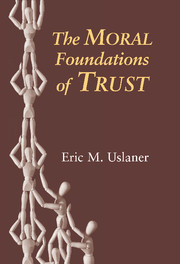Book contents
- Frontmatter
- Contents
- Preface
- 1 Trust and the Good Life
- 2 Strategic Trust and Moralistic Trust
- 3 Counting (on) Trust
- 4 The Roots of Trust
- 5 Trust and Experience
- 6 Stability and Change in Trust
- 7 Trust and Consequences
- 8 Trust and the Democratic Temperament
- Epilogue: Trust and the Civic Community
- Appendix A
- Appendix B
- Appendix C
- References
- Author Index
- Subject Index
Epilogue: Trust and the Civic Community
Published online by Cambridge University Press: 12 January 2010
- Frontmatter
- Contents
- Preface
- 1 Trust and the Good Life
- 2 Strategic Trust and Moralistic Trust
- 3 Counting (on) Trust
- 4 The Roots of Trust
- 5 Trust and Experience
- 6 Stability and Change in Trust
- 7 Trust and Consequences
- 8 Trust and the Democratic Temperament
- Epilogue: Trust and the Civic Community
- Appendix A
- Appendix B
- Appendix C
- References
- Author Index
- Subject Index
Summary
Thanks to recent cautionary tales, it's easy to wonder if everyone is out to get us. Treachery just isn't what it used to be in the good old days of gentlemen's duels. From an F.B.I. counterintelligence expert [exposed as a Russian spy] to a … busboy [who obtained the Internet passwords of 217 of the world's richest people and ran a series of scams that garnered him millions of dollars], cutting-edge duplicity fuels the rising public suspicion that no one is to be trusted.
– Bader (2001, WK4)Trust, once more, is the chicken soup of social life. But like chicken soup, its curative powers have been oversold. Both trust and chicken soup do lots of good things, but they don't cure all of our ills or solve all of the problems we face in daily life. Neither chicken soup nor trust will make us better golfers or bowlers or even make us more likely to join a bowling league. Both chicken soup and trust can make us feel better, and trust trumps chicken soup because it can also make us feel better about others. It can lead us to civic engagement with people who are different from ourselves and it can foster doing good deeds for those who are less fortunate. It can also make us more willing to look for common ground when we disagree with others about how to solve societal problems.
We are often wary of people who think differently from ourselves. And we are likely to think that people who look different from us may hold different values, as well.
- Type
- Chapter
- Information
- The Moral Foundations of Trust , pp. 249 - 256Publisher: Cambridge University PressPrint publication year: 2002



